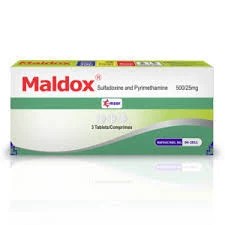Maldox Tablet And Suspension Composition, Side Effect, Dose, Use
Maldox is an antimalarial for the prevention of malaria. It is effective in both adults and children. It is the best drug of choice for preventing malaria in pregnant women. Maldox comes in tablet and suspension. The tablet is available in blisters of 3's and the suspension is available in a 15 ml bottle. Both are made by emzor pharmaceutical industries limited.
 |
| Maldox |
Composition Of Maldox
Composition Of Maldox Tablet
Each tablet of Maldox contains: Sulfadoxine 500mg, and Pyrimethamine 25mg.
Composition Of Maldox Suspension
Each 5ml suspension contains: Sulfadoxine 500mg, and Pyrimethamine 25mg.
Description
Maldox is prophylactic antimalarial. It is a synergistic combination of two antimalarial agents. It is indicated for Intermittent Preventive Therapy (IPT) of Malaria in Pregnancy.
Read Also: List of delivery essential in hospital
Pharmacology
Maldox is an antimalarial agent, which acts by reciprocal potentiation of its two components, achieved by a sequential blockade of two enzymes involved in the biosynthesis of folinic acid in the parasites. One of the major advantages of Maldox is that it attacks the different stages of the life cycle of the malaria parasite. Effective concentrations are rapidly attained with a single dose.
Trophozoites and schizonts are eliminated from the blood; the pre-erythrocytic stages are also affected while the secondary exo-erythrocytic forms are unaffected which may cause recurrence of infection with Plasmodium vivax. In such cases, therefore, consideration should be given to following up treatment with Primaquine to prevent recurrence.
Maldox is compatible with other antimalarial drugs, particularly artesunate, amodiaquine, quinine and some antibiotics. It has no hypoglycaemic effect and does not influence the action of antidiabetic agents.
Indications And Use Of Maldox
Intermittent Preventive Therapy in 2nd and 3rd trimester of pregnancy. Prophylaxis against malaria infection.
Dosage And Administration Of Maldox
In Intermittent Preventive Therapy: Three doses of 3 tablets of Maldox at no less than 4 weeks intervals after the first trimester. Do not take it during the first trimester of Pregnancy.
Read Also: Full list of antenatal routine essential drugs for pregnant women
Suspension
In Intermittent Preventive Therapy: Three doses of 15 ml bottle of Maldox at no less than 4 weeks intervals after the first trimester. Do not take it during the first trimester of Pregnancy.
Tolerability
Maldox is generally well tolerated at recommended doses. As with other drugs containing Sulfonamides, side effects like skin reactions and gastro-intestinal reactions may occur. Skin reactions like rash, pruritis and hair loss have been reported.
The reactions are however mild and remit with the withdrawal of the drug. Gastro-intestinal reactions include feeling of fullness, nausea, rarely vomiting and stomatitis.
Haematological changes have also been observed to c include thrombocytopenia and leukopenia in rare d cases. Other side effects include fatigue and headache.
Read Also: Safe and effective antimalarials for pregnant women in Nigeria
Contraindications Of Maldox
It is contra-indicated in those that are hypersensitive to Sulfonamides or to any component of the drug. In pregnancy, it is contra-indicated under the following conditions:
- In the first trimester
- In the last four weeks of the third trimester
- Concomitant use of Co-trimoxazole and any Sulfonamide-containing drugs
Warning And Precautions
Should cutaneous erythema appear, treatment should be stopped immediately. An adequate diuresis must be maintained and in case of renal disorder, administer low or less frequent doses to avoid drug accumulation. Special precautions should be taken in treating patients with conditions predisposing to deficiency of folic acid.
Side Effects Of Maldox
Maldox is generally all tolerated at the recommended doses. Side effects could include nausea, voming and diarrhea. Cutaneous eruption may occur and rarely there could be blood dyscrasia.

Comments
Post a Comment
Please have your say